Kids as young as five self harming, and suffering acute suicidal thoughts
Distressed SA kids are self-harming and thinking of suicide at a higher rate – and a younger age – than ever before, mental health experts warn. So what can mums and dads do?
SA News
Don't miss out on the headlines from SA News. Followed categories will be added to My News.
CHILD mental health experts warn more urgent action is needed to curb a surge in mental distress, with new figures showing a 58 per cent increase in emergency mental health presentations at the Adelaide Women’s and Children’s Hospital (WCH) over the past four years.
At the grassroots, community child and youth mental health workers are reporting self-harm and suicidal ideation is among the highest they’ve encountered, is more acute and affecting children at a younger age.
But they says access to acute and subacute care can be limited, with up to a nine-month wait for a first appointment with child and youth psychologists.
More funding and staff for acute mental health services and staff, and community and early intervention programs are being called for. As is, broader education to help parents, educators and peers identify, minimise, manage and prevent mental distress ending in self-harm and suicide.
“Make no mistake, self-harm at a very young age is real, and it’s rising rapidly,” said Centacare Catholic Family Services director Sarah McRae.
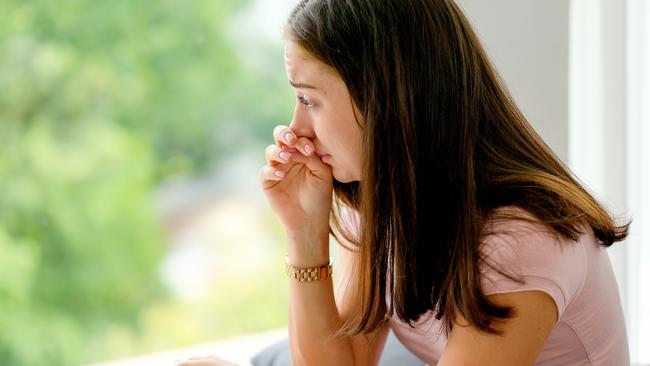
Ms McRae said the number of children seeking counselling through Centacare has increased exponentially in the past two years.
She said rising referrals for self-harm and suicidal ideation in children as young as five had “exposed a lack of specialist, early intervention” support services for children aged 12 or younger and their families.
New SA Health data shows the WCH recorded more than 4590 mental health-related ED presentations in 2020-21 compared to 2900 in 2017-18.
The annual rate of increase in mental health presentations at the WCH has been steady at about eight per cent over the past four years, until this year when ED presentations increased 34 per cent.
To cope with the increase, the Women’s and Children’s Health Network (WCHN) has added several ED mental health staff at the WCH, in North Adelaide, since February.
A WCHN spokeswoman said SA families could “rest assured the WCH emergency department offered safe and quality care to people with mental health needs” and encouraged people seek help and support if they were experiencing mental health challenges.
Kids Helpline has employed an extra 100 counsellors to meet rising demand since Covid. Its counsellors are more often needing to intervene in emergency cases where young callers have raised suicide.
In the six months to the end of May, counsellors intervened in 120 cases in SA, including 47 where a caller mentioned suicide. Among those were 18 calls from five to 11-year-olds.
During the same six month period the previous year there were 100 emergency interventions.
Tracy Adams, CEO of Yourtown which runs Kids Helpline, said pressures created by the pandemic were “taking a toll on the lives of children” nationwide.
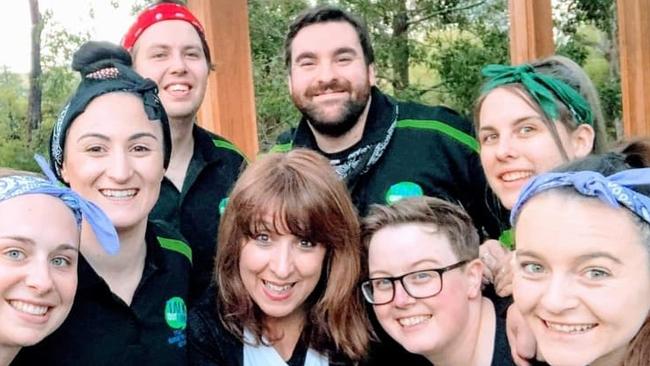
Talking Out Loud founder Mary Galouzis said there had been a rise in cases of self-harm, suicidal ideation and substance use disorders post-Covid in children and teenagers with many parents complaining they were finding it hard to access suitable psychiatric services.
“They are coming to us very, very desperate because they don’t know what to do – they don’t have access to help,” she said.
“We need to increase availability of clinical services but also to lived experience, peer and community services to help prevent mental distress escalating to an emergency situation,” said Ms Galouzis.
Psychiatrist Dr Ken Hooper said the wait in SA for new patients to access a child and adolescent psychiatrist was often nine months or more.
“When young people can’t get help for their mental health when they need it, they are more likely to present in crisis, which is often to the ED,” he said.
“This is why there has been increasing demands on our crisis and support services, and in our ED’s,” said Dr Hooper, chairman of the SA subcommittee for the Faculty of Child and Adolescent Psychiatry of the Royal Australian and New Zealand College of Psychiatrists.
He said that while every state can do better in funding the child and adolescent mental health sector, SA risked being left behind.
“Victoria has committed $3.8 billion into mental health, of which $639 million is specifically for children and youth,” he said. “WA also recently announced $495 million into mental health, including 99 more child and adolescent mental health staff.”
In June, the SA government announced its biggest ever spend on mental health – a $163.5 million package over four years that included more than $6.2 million for mental health initiatives for children and adolescents, such as increased counselling for children under 12 for earlier intervention and support. This is in addition to $1.3 million in mental health COVID-19 response funds to be spent this year on child and adolescent mental health, including for extra clinical staff.
A state government spokeswoman said the impact of the pandemic on young people was identified as a significant component of the government’s mental health response set up within two months of the first cases in SA.
YOUTH WORKER KATE: HOW THREE WORDS SAVED MY LIFE
Kate Pastro was a young adult sitting in the bedroom of her family home when she decided she’d had enough.
Suicidal ideation and self harm had been on her mind but she’d never acted on them.
“When I was thinking about self-harming, it was about wanting to relieve myself from the pain – distract the hurt from my head and heart – almost redirect it.”
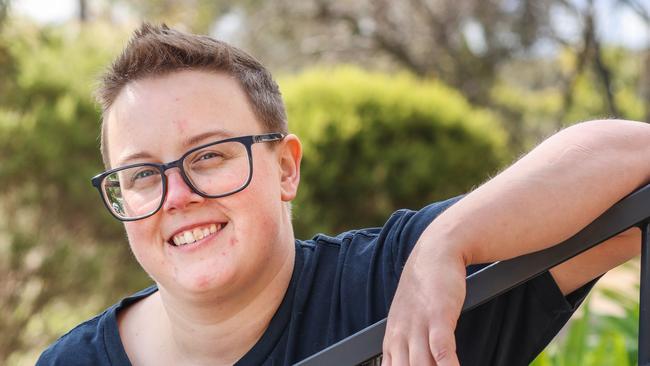
Ms Pastro thought she was home alone that day. “I was sitting in my bed, looking out the window and just thinking ‘today is the day’ and feeling relived.”
But then there was a knock at her bedroom door.
It was her mum Sheryl. “She opened the door and said: ‘I love you’,” says Ms Pastro.
“I was minutes, if not seconds away,” she says from taking her own life.
“To this day, I say she saved me because at that moment I felt no-one loved me, I felt alone and isolated and that nobody cared.”
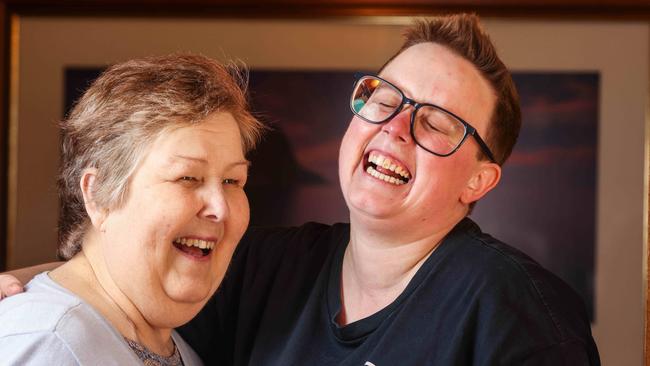
Ms Pastro then spoke openly to her mother about how she was feeling. She revealed for the first time that depression and anxiety had been with her since her early teens and had escalated after coming out gay in her early 20s, followed by an horrific car accident that seriously injured her partner.
“My mum was great,” she says, now aged 32. “She listened and didn’t judge.”
Ms Pastro, through her mum and GP, connected with a “brilliant’ psychologist who specialised in post traumatic stress and trauma and retrained her brain to think positively.
Kate went on to become a youth worker and has been helping youth and young adults working with peer support and suicide prevention community group Talk Out Loud, at Ridgehaven.
MICHAEL’S MOTHER: DON’T DISMISS SELF HARM
Jill Chapman is sitting at a kitchen table in the Adelaide office of the charity she set up to help those who self-harm.
It’s the day after commemorating the 20-year anniversary of her teenage son’s suicide.
She sips her coffee and warns self harm must to be taken seriously.
“I had this strange notion of a continuum of self-harm and it getting more and more serious before it would become attempted suicide,” she says.
Her son, Michael Chapman, died aged 16 on August 1, 2001.
She says she became aware he was self-harming about six months before his death, which came as a complete shock to her.
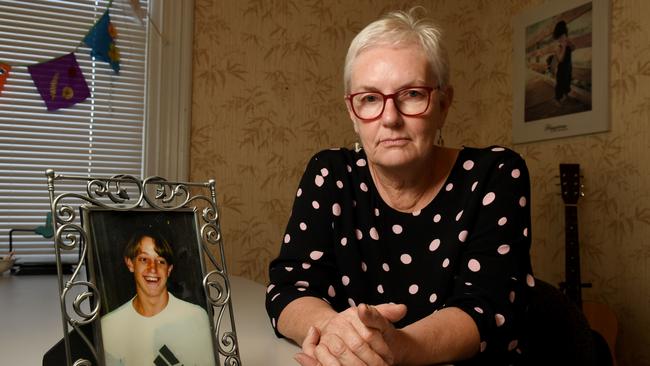
“Self harm is one of a number of risk factors and it can, at any one time become a contributing factor to suicide and should not be ignored,” says Ms Chapman.
Research worldwide has repeatedly identified that while self-harm might have different motivations, including attempted suicide, those who have self-harmed before are at increased risk of dying by suicide.
Ms Chapman says all carers, parents, teachers, mates and colleagues should become informed of the risks of suicide, learn the tools to ask the taboo questions: ‘Are you self-harming? Are you suicidal?’, without judgment, and then know what to do to help.
“Emotional first aid and suicide prevention should be like CPR (Cardiopulmonary resuscitation),” she says. “Most of us have an idea of how to do CPR to save a life but the reality is that there are more people we will encounter who need their lives saved because of suicidal distress than heart disease.”
Several years after Michael’s death, Ms Chapman set up the charity, Minimisation of Self Harm Australia (MOSH), which is run on donations.
To help MOSH or for support visit www.moshaustralia.org.au




